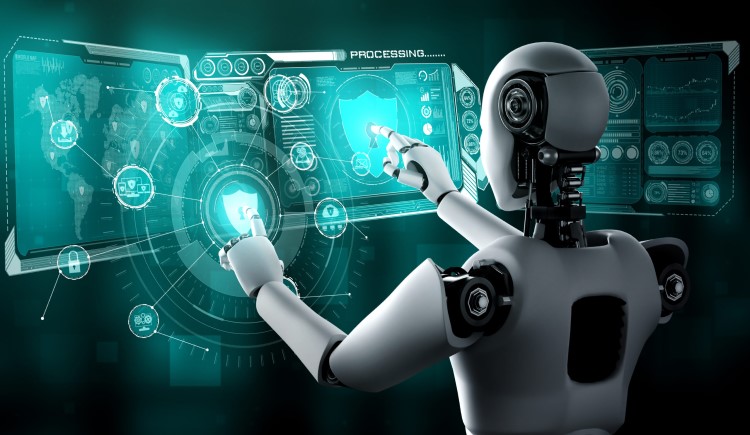
AI’s Role in Transforming Industries
AI is poised to transform industries across the board, driving efficiency and fostering innovation in sectors such as healthcare, finance, retail, and manufacturing. In healthcare, AI will enhance diagnostics and treatment plans through advanced data analysis and predictive algorithms. Machine learning models can identify patterns in patient data, helping doctors provide more accurate diagnoses and personalized care. Additionally, AI-powered robotic surgery and virtual health assistants will continue to revolutionize patient care.
In the finance sector, AI will streamline operations and improve risk management. Automated trading systems and AI-driven fraud detection tools are already enhancing accuracy and security. As businesses look ahead, what to expect from AI in the future includes more sophisticated algorithms that can analyze vast amounts of financial data in real time. This will help financial institutions make better investment decisions and reduce operational costs.
The retail industry will also see significant changes as AI improves customer experiences through personalization. By analyzing customer behavior and preferences, AI will enable retailers to offer tailored product recommendations and optimize inventory management. In manufacturing, AI will enhance predictive maintenance and process automation, reducing downtime and improving efficiency on production lines.
What to expect from AI in the future is a profound transformation of key industries. Through automation, data-driven insights, and enhanced personalization, AI will revolutionize how businesses operate, innovate, and serve their customers.
Advancements in AI-Powered Automation
Advancements in AI-powered automation are set to redefine industries by introducing smarter, more efficient systems. AI-driven robotics will play an increasingly significant role in manufacturing and logistics, handling complex tasks with greater precision and speed. These robots, equipped with machine learning algorithms, will be capable of adapting to new environments and learning from their experiences, making them more flexible than ever before. As automation becomes more intelligent, businesses can expect reduced operational costs and increased productivity.
Machine learning systems will also revolutionize decision-making processes in various sectors. These systems will continuously analyze vast amounts of data, identifying patterns and predicting outcomes with high accuracy. This capability will enable companies to automate everything from customer service to supply chain management, allowing for faster, more data-driven decisions. As a result, companies will improve efficiency while freeing up human workers for higher-value tasks, such as strategy and innovation.
The impact of these advancements on the workforce will be significant. While automation may replace certain routine tasks, it will also create new job opportunities that require more specialized skills. Workers will need to adapt by developing expertise in managing AI systems and collaborating with intelligent machines. What to expect from AI in the future is a shift towards human-AI collaboration, where automation handles repetitive tasks, and humans focus on creativity and problem-solving.
In the coming years, AI-powered automation will continue to evolve, leading to more intelligent systems that reshape how industries operate. These advancements will drive efficiency, enhance decision-making, and transform the workforce, making human collaboration with AI essential for future success.
Ethics and Responsible AI
As AI continues to evolve, ethical considerations and responsible AI development are becoming increasingly important. One of the key concerns is data privacy, as AI systems rely on vast amounts of personal and sensitive data for learning and decision-making. Ensuring that AI technologies are developed with robust data protection standards is crucial to prevent unauthorized access, breaches, and misuse of information. Going forward, businesses must prioritize transparency in how they collect, store, and use data, ensuring compliance with regulations like GDPR.
Bias in AI systems is another significant issue that must be addressed. AI algorithms can inherit biases from the data they are trained on, leading to unfair or discriminatory outcomes in areas like hiring, lending, and law enforcement. To mitigate this, developers need to audit AI models for bias and continuously monitor them to ensure fairness. Ethical AI development requires that systems are designed to be inclusive, transparent, and accountable. This will be essential as AI becomes more integrated into critical decision-making processes across various industries.
What to expect from AI in the future is an increased focus on ethical frameworks and guidelines for responsible AI implementation. Organizations will need to establish clear principles around fairness, accountability, and transparency to ensure that AI benefits society as a whole. Developing AI technologies responsibly will build trust, safeguard privacy, and minimize the risks associated with biased or unethical applications.
Responsible AI development will play a pivotal role in shaping the future of technology. By addressing data privacy, mitigating bias, and fostering transparency, AI can be developed ethically, ensuring its positive impact on society.
AI and Personalized Customer Experiences
AI is set to revolutionize personalized customer experiences, making consumer interactions more tailored and relevant than ever before. One of the primary ways AI will achieve this is through predictive analytics, which allows businesses to analyze customer behavior and preferences to anticipate their needs. By processing large volumes of data, AI can provide highly personalized recommendations and solutions in real time, enhancing customer satisfaction and increasing sales. This kind of hyper-personalization will allow businesses to deliver experiences that feel custom-made for each individual.
Recommendation engines, driven by machine learning algorithms, will play a significant role in personalizing the shopping and browsing experience. These engines analyze previous purchases, browsing history, and demographic information to suggest products or services that align with the customer’s preferences. Whether on e-commerce platforms or streaming services, these AI-driven systems will ensure that customers receive recommendations that are more likely to meet their needs, leading to higher engagement and loyalty.
In addition, AI will further enhance marketing strategies by allowing businesses to create tailored marketing campaigns based on individual customer profiles. From personalized emails to targeted ads, AI will help marketers deliver the right message at the right time. This increased relevance improves conversion rates as well as strengthens customer relationships. What to expect from AI in the future is even more sophisticated personalization capabilities that will drive customer engagement across all digital touchpoints.
As AI continues to advance, it will reshape how businesses interact with consumers. By leveraging predictive analytics, recommendation engines, and personalized marketing, companies will offer more meaningful and individualized customer experiences. This transformation will be key to maintaining a competitive edge in the digital marketplace.
AI in Decision-Making and Business Strategy
AI is becoming an indispensable tool for data-driven decision-making, and its role in shaping business strategy is only set to grow. With access to vast amounts of data, AI can analyze trends, forecast outcomes, and provide actionable insights faster and more accurately than traditional methods. As a result, businesses can make more informed decisions, reducing risks and seizing opportunities in real-time. This capability allows companies to react quickly to market changes, giving them a competitive advantage.
Incorporating AI into strategic planning helps organizations identify emerging trends and shifts in customer behavior that might otherwise go unnoticed. By analyzing consumer data, market conditions, and competitive landscapes, AI can guide companies in making smarter decisions about product development, pricing strategies, and expansion plans. AI-driven simulations also allow businesses to test different scenarios, helping them refine their strategies and anticipate potential challenges. This data-backed approach enhances business agility and ensures strategies are grounded in real-world insights.
What to expect from AI in the future is even greater integration into decision-making processes, transforming how businesses approach strategy. Companies that leverage AI for data analysis will enjoy faster, more efficient decision-making that keeps them ahead of the competition. AI will become a critical asset in refining business strategies, aligning organizational goals with market trends, and also driving sustained growth.
AI’s role in business decision-making will continue to expand as companies increasingly rely on data-driven insights to navigate complex markets. By embracing AI technologies, businesses can enhance their strategic planning, make better decisions, and also secure a stronger competitive position.
The Future of AI and Human Collaboration
The future of AI will not only involve automation but also collaboration with humans, creating an environment where AI complements human abilities. AI’s analytical power can handle repetitive tasks and large data sets, allowing humans to focus on more creative, strategic thinking. This partnership will enable workers to solve complex problems faster, using AI-generated insights to guide decisions while applying their own creativity and critical thinking.
AI can also enhance collaboration in the workplace by streamlining communication and automating routine administrative tasks. With AI-powered tools that manage workflows, schedule meetings, and even assist in project management, employees will have more time to focus on meaningful work. Furthermore, AI can act as a collaborative tool by providing real-time data analysis and insights. This helps teams make informed decisions more efficiently.
What to expect from AI in the future is a deeper integration of AI and human collaboration, especially in fields requiring creative problem-solving. AI can generate new ideas based on data patterns. However, it will be human workers who bring intuition, empathy, and innovation to those ideas. By blending the strengths of AI and human expertise, workplaces can foster more innovative solutions and increase productivity.
In conclusion, the future will see AI working alongside humans in a complementary role, enhancing creativity, problem-solving, and collaboration. This human-AI partnership will allow businesses to tap into the best of both worlds. This will result in improved outcomes as well as a more dynamic workforce. Embracing this collaboration will be key to thriving in an AI-driven future.
Conclusion
In conclusion, AI will continue to revolutionize industries and redefine how businesses operate. From enhancing decision-making to driving personalization, AI is becoming a key tool in every sector. As businesses integrate AI into strategic planning and daily operations, what to expect from AI in the future is a shift toward greater efficiency, creativity, and innovation. AI will not replace human capabilities but instead complement them, fostering collaboration and solving complex problems. As AI evolves, businesses must adapt, embracing the technology while ensuring ethical and responsible development. This partnership between humans and AI will shape the future of work and society.


